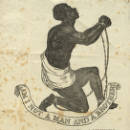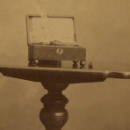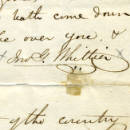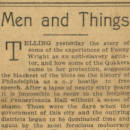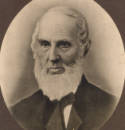
John Greenleaf Whittier
By Patricia O'Donnell
Archivist, Friends Historical Library
Featured Image:Virtuous Harry, or Set a Thief to Catch a Thief! Henry Clay was a controversial figure in the Society of Friends. As a
leading statesman and compelling orator, Clay initially commanded a large Quaker
following--especially among the Orthodox--but his support gradually waned (Ryan P.
Jordan, Slavery and the Meetinghouse. Bloomington: Indiana Univ. Press, 2007.
p. 51). He presented himself as a moderate antislavery advocate--he was president of
the American Colonization Society, and,
as this political cartoon shows, he opposed admitting slave territories like Texas
into the Union. Nevertheless, Clay owned slaves himself. As the cartoon further
demonstrates, this earned him a reputation for hypocrisy in the eyes of certain
Quakers. John Greenleaf Whittier was one such Friend. He supported Clay's
Presidential bid at the 1831 Republican National Convention, but later opposed Clay
when he ran as the Whig candidate."[O]ur Henry Clay," a disillusioned
Whittier wrote in 1838, "the man we have all loved and honored and forgiven--will
he stoop to meanness so ineffable?" (qtd. in Pickard,
vol. I, pp. 237-238). Shortly after Henry Clay spoke at Indiana Yearly
Meeting during a campaign tour in 1844, a schism in the group resulted in the
formation of the Indiana Yearly Meeting of Anti-Slavery Friends. Whittier publicly
denounced the group of Indiana Quakers who sided with Clay against the abolitionists
(Jordan, p. 54-55).
|
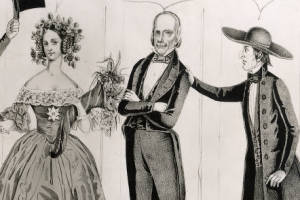 |
| TEXAS (woman, left): "Shall the slanders that have
been urged against your sister, sever those whose blood flows from
the same fountain?" CLAY (center): "Stand back Madam Texas! for we are more holy than thou! Do you think we will have anything to do with gamblers, horse-racers, and licentious profligates?" QUAKER (right): "Softly, Softly, friend Harry. Thou hast mentioned the very reason that we cannot Vote for thee!" |
On September 7, 1892, the Kansas City Star announced the death of John Greenleaf Whittier by proclaiming "Freedom's Poet at Rest." Although he did enjoy widespread fame as a poet during his own lifetime, it is Whittier's work as an abolitionist that earns him the most scholarly attention in the modern era.
He was born on December 17, 1807, in Haverhill, Massachusetts. The son of John and Abigail Hussey Whittier, poor Quaker farmers, he began to write poetry at the age of fourteen. William Lloyd Garrison published Whittier's first poem in 1826 and persuaded his parents to send him to Haverhill Academy for two terms. Whittier's early poetry was well-received on the local level, but he himself was dissatisfied with much of the work from this period, including his first book, Legends of New-England, which was published in Hartford by Hanmer & Phelps in 1831.
For several years Whittier supported himself as a newspaper editor. In 1829 he obtained a position at The American Manufacturer, a political weekly in Boston owned by moral reformer Rev. William Collier. Although he only served as its editor for less than a year, he moved on to similar jobs with the Haverhill Essex Gazette and the Hartford, Connecticut, New England Review. His newspaper work both whetted his appetite for politics and exposed his opinions to the populace. Editorial support for the Whig, Henry Clay, earned him acclaim. Whittier was chosen as a delegate to the Republican National Convention in 1830, campaigned unsuccessfully for a Congressional seat in 1832, and served one term in the Massachusetts legislature a few years later.
By most accounts, in 1833 Whittier renewed his friendship with William Lloyd Garrison, the publisher of his first poem back in 1826. By this time Garrison had become a radical abolitionist, and sought to enlist Whittier in the cause. The latter served as a delegate to the first meeting of the American Anti-Slavery Convention. In 1833, Whittier published a tract, Justice and Expediency: or, Slavery considered with a view to its rightful and effectual remedy, abolition, proposing immediate and unconditional emancipation of slaves. He became known as a leading abolitionist, active in lecturing, editing newspapers, and writing poems and essays supporting anti-slavery. In general, much of his poetry from this period was hastily written and of middling quality, but it was effective in promoting the cause. He was stoned by an anti-abolitionist mob in Concord, New Hampshire in 1835, but was undeterred by the incident--a collection of his abolitionist verse, Poems Written during the Progress of the Abolition Question in the United States, appeared in print in 1838.
That same year, Whittier accepted the editorship of the Pennsylvania Freeman. Its offices were located in the ill-fated Pennsylvania Hall, which was shortly destroyed during an anti-abolitionist riot on May 17, 1838. In the midst of the attack, Whittier bravely donned a disguise and entered the burning hall in order to save his galleys. Soon after the Pennsylvania Hall incident, Whittier broke with Garrison over radical abolitionist tactics in 1839. Believing that the anti-slavery movement needed a political vehicle, he helped found the Liberty Party.
Poor health forced Whittier's retirement after 1840 to Amesbury, Massachusetts, where his poetry focused on New England rural life and traditions. Although he published Voices of Freedom in 1846, the '40s saw his gradual withdrawal from political activism. His poems "Snow Bound" and "Tent on the Beach" were critical and financial successes, and after the Civil War he was widely acclaimed as a major American poet. His later poetry focused on religious and moral themes, combining Quaker quietism with a respect for the Bible.
References
Jarvis, Charles A. "Admission to Abolition: The Case of John Greenleaf Whittier." Journal of the Early Republic 4:2 (Summer 1984), 161-176.
Pickard, Samuel T., editor. Life and Letters of John Greenleaf Whittier. Boston: Houghton, Mifflin & Co., 1894.
Whittier, John Greenleaf, 1807-1896. John G. Whittier Manuscript Collection, Friends Historical Library of Swarthmore College, MSS 063.

